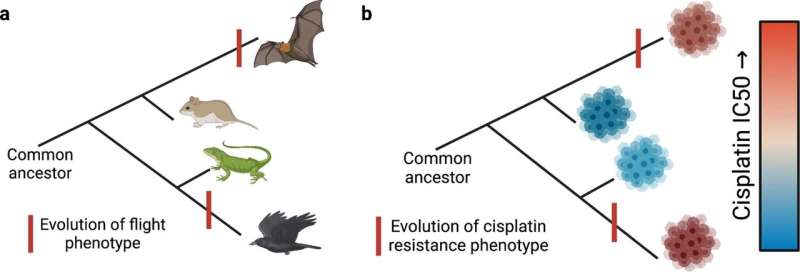This article has been reviewed according to Science X's editorial process and policies. Editors have highlighted the following attributes while ensuring the content's credibility:
fact-checked
peer-reviewed publication
trusted source
proofread
Research predicts cancer patients' response to chemotherapy agent cisplatin

Researchers at Cleveland Clinic have taken an important step in predicting which treatment will work for individual cancer patients. Using a gene signature developed from cell lines and human tissue, the research team demonstrated the ability to predict a patient's response to the chemotherapy agent cisplatin, without relying on changes in the mutational status of a patient's cancer. The study was recently published in npj Precision Oncology.
In recent years, effective new cancer treatments have emerged that extend the lives of patients with targetable gene mutations. However, only an estimated 7% of patients with cancer have a genetic mutation that is targetable. These new understandings could help many patients avoid toxicities associated with chemotherapy and move to an option that's more likely to be effective.
"Currently if you look at a population-based level, we know that a certain percentage of patients will respond to a given chemotherapy, but we want to know 'which one will work for the patient in front of me'?" said Jacob G. Scott, M.D., D.Phil., study co-corresponding author and head of the Theory Division Laboratory in the Department of Translational Hematology and Oncology Research at Cleveland Clinic.
Researchers have worked for years to use gene signatures for predictive medicine, but it has been difficult to interpret how specific gene signatures would act in the human body. In this study, the team aims to overcome this obstacle by incorporating tumor samples into its extraction methods.
The Cisplatin Response Signature, CisSig, is shown to predict response to cisplatin within cell lines. Using a new signature extraction method, the researchers produced CisSig to predict how well patients with tumors that originated in epithelial cells would respond to the therapy. With this information, they derived a score to determine how well an individual would respond to cisplatin.
While cisplatin is used as a first-line agent for many cancers, it is also one of the oldest chemotherapy agents. "If we can help a patient avoid a medication they're not going to respond to, and move to a second-line agent they're more likely to benefit from, that has a big impact," said Jessica A. Scarborough, Ph.D., lead study author and fellow in the Department of Translational Hematology and Oncology Research at Cleveland Clinic.
The researchers conducted preliminary validation of their approach for patients with muscle-invasive bladder cancer. Using two cohorts of pre-treatment tumor samples, they demonstrated that CisSig was predictive of therapeutic response to cisplatin.
To further validate their approach, the research team plans to build on this work with larger-scale retrospective studies. Using tissues from the Cleveland Clinic Biobank, they are sequencing the gene signatures of patients with bladder as well as head and neck cancers treated with cisplatin. In addition, the team has an NIH-sponsored study to test this score prospectively in both bladder and head and neck cancers.
More information: Jessica A. Scarborough et al, Exploiting convergent phenotypes to derive a pan-cancer cisplatin response gene expression signature, npj Precision Oncology (2023). DOI: 10.1038/s41698-023-00375-y




















